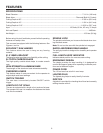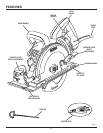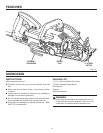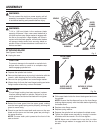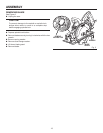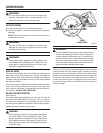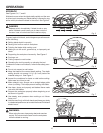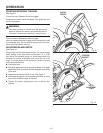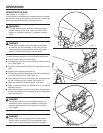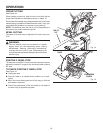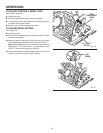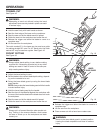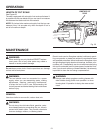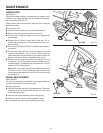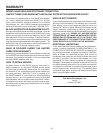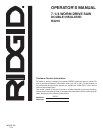
20
21
Fig. 20
LENGTH OF CUT
SCALE
MAINTENANCE
WARNING:
When servicing use only identical RIDGID
®
replace-
ment parts. Use of any other parts may create a
hazard or cause product damage.
Do not abuse power tools. Abusive practices can damage
tool as well as workpiece.
WARNING:
The tool should never be connected to a power
supply when you are assembling parts, making
adjustments, cleaning, performing maintenance,
or when the tool is not in use. Disconnecting the
tool will prevent accidental starting that could cause
serious injury.
GENERAL
Use clean cloths to remove dirt, carbon dust, etc.
WARNING:
Do not at any time let brake fluids, gasoline, petro-
leum-based products, penetrating oils, etc. come in
contact with plastic parts. They contain chemicals
that can damage, weaken, or destroy plastic.
Electric tools used on fiberglass material, wallboard, spack-
ling compounds, or plaster are subject to accelerated wear
and possible premature failure because the fiberglass chips
and grindings are highly abrasive to bearings, brushes, com-
mutators, etc. Consequently, we do not recommended using
this tool for extended work on these types of materials. How-
ever, if you do work with any of these materials, it is extremely
important to clean the tool using compressed air.
WARNING:
Always wear safety goggles or safety glasses with
side shields during power tool operation or when
blowing dust. If operation is dusty, also wear a dust
mask.
LENGTH OF CUT SCALE
See Figure 20.
The saw is equipped with a length of cut scale on its base. It
is parallel with the saw blade and you can use it to measure
the distance the blade cuts into the material.
NOTE: Six inches is the maximum length of cut that you can
measure. Also, it is accurate only when the depth of cut is
set at full maximum depth.
OPERATION



